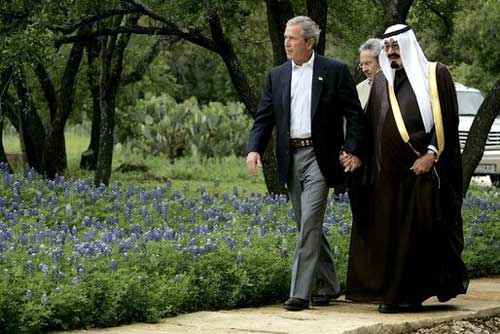 An editorial / By Dale McFeatters Scripps Howard News Service April 26, 2005
But the meeting only underscored how little the head of the world's largest economy and the head of the world's largest oil supplier can do about short-term oil prices and how much the long-term picture is subject to factors - like the booming economies of China and India - out of their control.  White House photo by David Bohrer The Bush administration would like the Saudis to up their output. And the crown prince's delegation did stress previously announced plans to spend $50 billion to increase their oil production capacity from 10.8 million barrels a day now to 12.5 million by 2009 and 15 million within 10 years after that. The Saudis, however, insisted that upping production wouldn't help the United States because of a lack of American refining and storage capacity. This, among other factors, moved Bush to observe, "One thing is certain. I need to sign an energy bill." Bush has conceded that his energy bill would do little to solve the immediate problem of high gasoline prices - a national average of $2.24 a gallon for regular last week. His energy bill would streamline regulatory approval of new refineries. But first a refiner must come forward that believes such a huge project is economically worthwhile and then the refiner must overcome certain NIMBYs to find a place to build it. Saudi oil is important to the United States, accounting for about 15 percent of supply, but not necessarily vital. Our largest suppliers by far are Canada and Venezuela. However, Saudi Arabia is central to U.S. policy in the Arab world. The meeting in Crawford, Texas, was intended as another in a series of steps to mend relations that soured after 9/11. As part of that process, a statement issued after the meeting said: "While the United States considers that nations will create institutions that reflect the history, culture and traditions of their societies, it does not seek to impose its own style of government on the government and people of Saudi Arabia." In other words, the Bush policy of spreading democracy stops at the Saudi border. Thus the soaring rhetoric of the president's second inaugural meets the real politik of oil and the politics of the Mideast.
Distributed by Scripps Howard News Service, http://www.shns.com Publish A Letter on SitNews Read Letters/Opinions Submit A Letter to the Editor
|